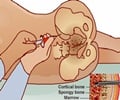Experts at The Children's Hospital of Philadelphia have discovered that a protein called Lnk is key to the normal growth of blood cells, shedding new light on the biological events.
Experts at The Children's Hospital of Philadelphia have discovered that a protein called Lnk is key to the normal growth of blood cells, shedding new light on the biological events that convert stem cells in the bone marrow into the broad variety of cells that circulate in the blood.
The researchers say that their findings may help improve the success of bone marrow transplants, and lead to better treatments for life-threatening blood diseases."As we better understand the biological pathways that regulate the growth of stem cells, we may identify new approaches for treating blood disorders," said Dr. Wei Tong, a hematology researcher at The Children's Hospital of Philadelphia, who led the study published online in the Journal of Clinical Investigation.
Hematopoietic stem cells (HSCs) develop into all types of blood cells-red blood cells, platelets and immune cells. They can give rise to mature, developed cells with more specific functions, as well as a new stem cell.
The Lnk protein helps control HSC expansion. When a growth factor in the blood called thrombopoietin (TPO) acts on its cell receptor, it triggers signals along a pathway that includes another protein, JAK2. JAK2, in turn, causes stem cells to increase their numbers.
A previous study led by Tong had suggested that Lnk was a negative regulator for HSCs, which acted as a brake on stem cell expansion.
In their latest study, her team observed that mice genetically engineered to lack the Lnk protein had 10 times the normal amount of HSCs in their bone marrow.
Advertisement
However, there was an unexpected potential benefit-- the expanded population of stem cells had a higher proportion of quiescent cells, those in a resting stage in the cell cycle.
Advertisement
She believes that building on this knowledge, other researchers may be able to manipulate HSCs for more effective bone marrow transplants for cancer patients after high-dose chemotherapy or radiotherapy.
According to her, using a drug to inhibit Lnk could potentially produce larger numbers of HSCs for a successful bone marrow transplant.
Source-ANI
SRM













